In a surprising turn of events, the UK insurance landscape has been reshaped as Direct Line Group (DLG) founder, Peter Wood, shares his thoughts on Aviva’s takeover agreement. Investors and industry experts alike are closely scrutinizing the impact this merger may have across the insurance sector. This unprecedented move not only marks a significant shift in market dynamics but also raises several questions about the future of competition, customer choice, and regulatory hurdles.
The acquisition was announced following Aviva’s strategic decision to cement its dominance in the insurance industry. The merger aims to bolster Aviva’s market position by enhancing its product offerings, financial strength, and customer base. Peter Wood, who founded DLG in 1985 and served as its CEO for several years, expressed a measured response to the news, highlighting both opportunities and challenges that lie ahead.
Market observers had anticipated various consolidation moves in the insurance sector, driven partly by evolving customer expectations, technological advancements, and cost efficiencies. However, Aviva’s decision to acquire DLG—a well-established, household name—has come as a surprise to many. Wood emphasized the importance of maintaining the quality of services and products that DLG is known for, while also recognizing the potential benefits of synergies between the two companies.
“The integration of these two powerhouses is bound to create a significant hallmark in the industry,” Wood commented. “However, it is critical to ensure that the merger does not compromise the competitive essence that has greatly benefited consumers over the years. It is vital that we retain the customer-centric focus that DLG has championed and leverage this to introduce innovative insurance solutions going forward.”
Industry experts have started dissecting the implications of the merger, both immediate and long term. The most pertinent aspect of the acquisition is its potential to disrupt market competition. Combined, Aviva and DLG will hold a sizeable share of the UK insurance market, potentially creating a behemoth with substantial leverage over smaller competitors. Such a concentration of market power raises concerns about reduced competition, which could lead to higher premiums for customers in the absence of viable alternatives.
Additionally, the merger brings forth discussions about regulatory scrutiny. With the notable increase in market concentration, the Competition and Markets Authority (CMA) is expected to closely examine the agreement to ensure fair competition is maintained. Regulatory bodies will likely impose conditions to prevent monopolistic behaviors and protect consumer interests, making the merger’s smooth execution more complex.
From an operational standpoint, the merger invites increased scrutiny on workforce integration and cost synergies. With both companies having well-established processes and infrastructures, aligning their operations will require careful strategic planning. Both Aviva and DLG will need to solidify a coherent framework that leverages the strengths of both entities while also minimizing redundancies.
In terms of financial effects, stakeholders are evaluating the prospective scale of economies of the merger. While initial challenges are expected to arise from integration-related costs, the overall financial synergies are anticipated to enhance shareholder value. Aviva’s expansive market reach combined with DLG’s innovative offerings could potentially pave the way for stronger growth trajectories and better return on equity.
Investor sentiment has exhibited a mixed response to the merger news. Shares of both Aviva and DLG experienced a temporary boost following the announcement, reflecting initial optimism about potential cost reductions and expanded market share. However, the overarching sentiment remains cautiously optimistic as stakeholders weigh the tangible benefits against short-term execution risks.
The takeover also opens up wide-ranging ramifications beyond the UK market. Such a consolidation might set a precedent for other insurance companies keen on exploring similar opportunities, whether through mergers or strategic alliances. As the industry grapples with challenges such as digital transformation and climate risk, significant market shifts could become more frequent.
As the merger progresses, attention shifts to how Aviva and DLG will articulate their combined strategy to establish themselves as industry leaders sustainably. Ensuring a smooth transition requires transparent communication not only to investors but to customers and employees, addressing their concerns and maintaining their trust in the process.
Looking forward, the path to successful integration will be paved with intricate strategic maneuvers, leadership excellence, and nurturing a cohesive organizational culture. Aviva and DLG’s ability to navigate regulatory landscapes, achieve synergy targets, and restyle competitive strategies will ultimately determine the merger’s long-term success and its footprint on the insurance industry.
In conclusion, the Aviva-DLG merger holds notable implications for the insurance sector and beyond. While the future remains equally challenging and exhilarating, stakeholders are poised to witness a new chapter unfold, shaping the evolutionary path of the industry. Adhering to their legacy of consumer-first policies, both companies stand to redefine industry standards and set a new benchmark for integrated, comprehensive insurance services.












